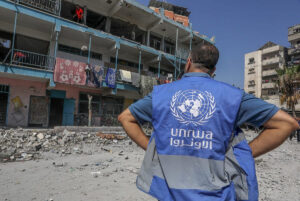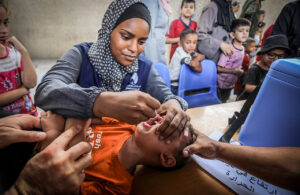Israel’s paradoxical crusade against UNRWA

Palestinians at the site of an Israeli airstrike at a UNRWA school in the Nuseirat camp in central Gaza, 6 June 2024
Jonathan Adler writes in +972 on 10 October 2024:
Last month, nearly a year into Israel’s genocidal war, there finally seemed to be a small dose of good news from the Gaza Strip. After the destruction of Gaza’s healthcare and wastewater management infrastructure, a widespread polio epidemic in the besieged territory appeared likely by mid-summer, when the disease was first detected in sewage samples; in early August, a 10-month-old baby contracted the disease and quickly became paralyzed. International media and aid organizations sounded the alarm, yet there seemed to be little chance of conducting a successful mass inoculation campaign in the absence of a ceasefire — an outcome that, after Israel’s assassination of Hamas leader Ismail Haniyeh, grew further out of reach.
Then things started to shift. On August 25, Israel announced that the Coordinator of Government Activities in the Territories (COGAT) — the civilian branch of Israel’s military government in the occupied West Bank and Gaza — had coordinated with the World Health Organization (WHO) and the UN Children’s Fund (UNICEF) to bring 1.2 million doses of the polio vaccine into Gaza. A week later, the Israeli government agreed to pause its military offensive in discrete regions of the Strip to ensure vaccines could be distributed. Prime Minister Benjamin Netanyahu was quick to affirm that these pauses were not a ceasefire, but that Israel was “committed to preventing an outbreak of the disease in the Gaza Strip, as well as in the entire region.”

A healthcare worker administers a dose of the oral polio vaccine in Deir al-Balah, 1 September 2024
These Israeli decisions did not arise out of a sudden concern for the welfare of Palestinians. In July, when polio was beginning to spread in Gaza, Israel’s first priority was to administer polio booster shots to its own troops. Yet even vaccinated soldiers could still be a vector for the virus, carrying it from Gaza back into Israel. This posed an immediate threat to Israeli citizens — and, in particular, to the approximately 150,000 children who have not been vaccinated against polio, many from the ultra-Orthodox community.
Over the first two weeks of September, three-day “polio pauses” — first in the Deir al-Balah area, then in and around Khan Younis, and finally in Gaza City and the decimated northern Strip — were largely effective. Aid workers traveled to hundreds of designated vaccination sites, and by Sept. 12, nearly 560,000 Palestinian children under the age of 10 had received a first dose of the oral polio vaccine, reaching 90 percent coverage. To administer the necessary second dose, the WHO is now planning to launch the next phase of vaccinations in mid-October through a similar structure of polio pauses.
